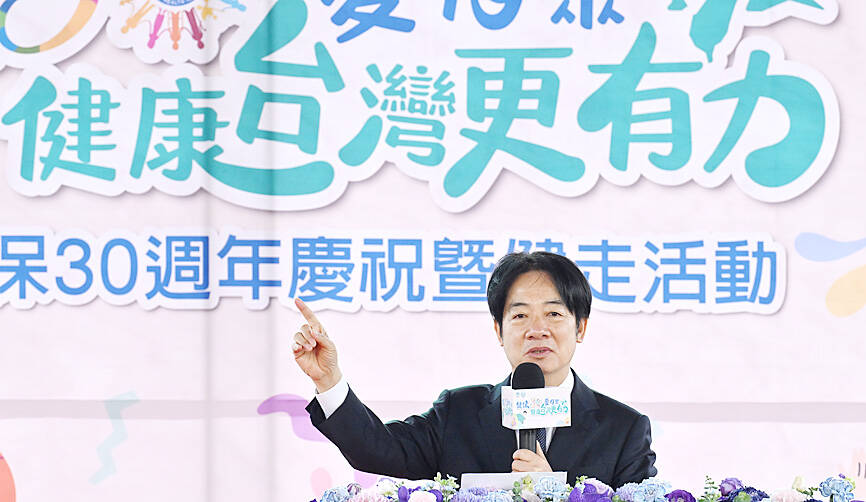An “unequal pay for unequal work” structure should be considered for National Health Insurance (NHI) payments as a possible solution to healthcare worker shortages in some hospital departments, President William Lai (賴清德) said yesterday in a speech at an NHI 30th anniversary event at the Taipei Expo Park.
Lai thanked former health officials who helped establish the NHI system, as well as the “continuous effort” of healthcare workers, for keeping the NHI system functioning for 30 years.
The system is important for achieving health equity and ensuring people of different ethnicities, genders, ages and economic statuses can receive equal healthcare, Lai said, adding that it has also extended life expectancies, and allowed people to spend less on healthcare and instead invest in education or innovation, driving Taiwan’s social development.

Photo: Liu Hsin-de, Taipei Times
Taiwan’s public health and healthcare services have often been ranked top in international accreditations and the nation’s prudent disease prevention policies have also earned international praise, he said.
The government must consider how to keep the system running and improve healthcare services, so his administration has set up the Healthy Taiwan Promotion Committee, expanded funding and eligibility for cancer screening, introduced a new cancer drugs fund, pushed forward a “three-highs” prevention program and is establishing a ministry of sports, he said.
However, the government must also solve problems that the NHI faces, including a shortage of doctors, he said.
Dentistry has outstripped medicine among high-school graduates choosing a university major, hinting a more serious shortage of doctors might await, Lai said.
“We must solve this problem,” he said. “I think we should consider the idea of ‘unequal pay for unequal work.’”
The NHI payment system runs on the edicts of “equal pay for unequal work” and “case rate payments,” but the government should consider making a structural adjustment, or physicians will be unwilling to take up more difficult specialties, he said.
Lai said that he recently spoke with an internationally renowned reconstructive surgeon, who asked him to guess how much they were paid from the NHI for an eight-to-10-hour surgery.
He imagined that they perhaps received NT$100,000 to NT$200,000, but the surgeon said it was only NT$60,000 to NT$80,000, Lai said.
“The [doctor shortage] problem is very serious,” Lai said, adding that he has discussed the issue with the minister of health and welfare and the NHI Administration’s [NHIA] director-general.”
“We must brainstorm ideas with many people to find solutions,” he said.
Speaking with reporters on the sidelines of the event, NHIA Director-General Shih Chung-liang (石崇良) said that “unequal pay for unequal work” can be divided into two dimensions: location and department.
The current system provides bonuses to healthcare services on outlying islands and in remote areas, Shih said, adding that the NHI has recently adjusted payments for emergency departments and is mulling adjustments to outpatient consultation fees according to department, and depending on whether a diagnosis is “normal” or “complicated.”
The issue would be discussed with specialists, decided by consensus and forwarded to the ministry for approval, he added.
Additional reporting by CNA

Several Chinese Nationalist Party (KMT) officials including Chairman Eric Chu (朱立倫) are to be summoned for questioning and then transferred to prosecutors for holding an illegal assembly in Taipei last night, the Taipei Police said today. Chu and two others hosted an illegal assembly and are to be requested to explain their actions, the Taipei City Police Department's Zhongzheng (中正) First Precinct said, referring to a protest held after Huang Lu Chin-ju (黃呂錦茹), KMT Taipei's chapter director, and several other KMT staffers were questioned for alleged signature forgery in recall petitions against Democratic Progressive Party (DPP) legislators. Taipei prosecutors had filed

Taiwan would welcome the return of Honduras as a diplomatic ally if its next president decides to make such a move, Minister of Foreign Affairs Lin Chia-lung (林佳龍) said yesterday. “Of course, we would welcome Honduras if they want to restore diplomatic ties with Taiwan after their elections,” Lin said at a meeting of the legislature’s Foreign Affairs and National Defense Committee, when asked to comment on statements made by two of the three Honduran presidential candidates during the presidential campaign in the Central American country. Taiwan is paying close attention to the region as a whole in the wake of a

NEW WORLD: Taiwan is pursuing innovative approaches to international relations through economics, trade and values-based diplomacy, the foreign minister said Taiwan would implement a “three-chain strategy” that promotes democratic values in response to US tariffs, Minister of Foreign Affairs Lin Chia-lung (林佳龍) said. Taiwan would aim to create a “global democratic value chain,” seek to capitalize on its position within the first island chain and promote a “non-red supply chain,” Lin was quoted as saying in the ministry’s written report to the Legislative Yuan submitted ahead of the legislature’s Foreign Affairs and National Defense Committee meeting slated for today. The Ministry would also uphold a spirit of mutual beneficial collaboration, maintaining close communication and consultations with Washington to show that Taiwan-US cooperation

Taiwan and the US have begun trade negotiations over tariffs imposed by US President Donald Trump earlier this month, Minister of Foreign Affairs Lin Chia-lung (林佳龍) said in an interview this morning before reporting to the Legislative Yuan’s Foreign Affairs and National Defense Committee. The Taipei Economic and Cultural Representative Office (TECRO), Taiwan’s de facto embassy in the US, has already established communication channels with the US Department of State and the US Trade Representative (USTR), and is engaging in intensive consultations, he said. Points of negotiation include tariffs, non-tariff trade barriers and issues related to investment, procurement and export controls, he